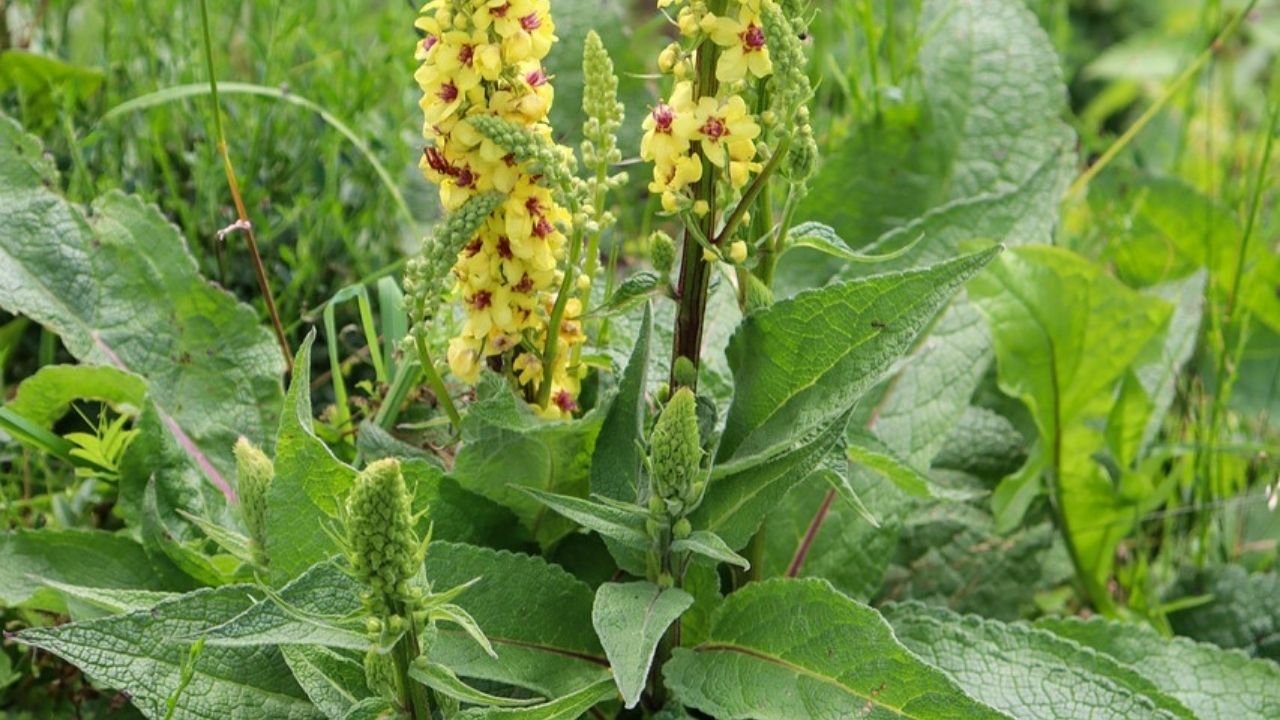Among the vast field of natural remedies, mullein leaf is known for its versatile properties and innumerable health benefits. This herb has been used for many years to address various health concerns. In this article, we will learn in detail about the rich history, botanical characteristics, uses, and potential health benefits of mullein leaf.

History and Botanical Background of Mullein Leaf
Mullein, scientifically known as Verbascum thapsus. It has a rich history dating back centuries. This plant is native to Europe, Asia, and North Africa. It is a biennial plant used in the traditional medicine of various cultures. This plant is easily recognized by its long stem, soft leaves covered with fine hairs, and distinctive yellow flowers.
Characteristics of Mullein Leaf
A. Botanical Features
- It is a biennial plant with a strong stem.
- Its leaves are soft and covered with soft hairs.
- It has yellow, densely packed flowers in a spike structure.
B. Cultural Significance
- It has been used in traditional medicine by various cultures for centuries.
- It is used for respiratory and skin conditions.
Health Benefits and Uses
1. Respiratory Health
Mullein leaf is known to have positive effects on respiratory health. This plant contains several compounds that have expectorant properties, making it beneficial for many conditions:
- Cough and congestion: Mullein is often used to relieve cough and respiratory congestion.
- Bronchitis: Its soothing nature can help relieve the symptoms of bronchitis.
2. Ear Health
- Ear Infections: Mullein oil, extracted from its flowers, is used to address ear infections.
3. Anti-Inflammatory Properties
Mullein leaf has anti-inflammatory effects, making it useful for many conditions such as:
- Arthritis: This herb can help reduce inflammation of the joints.
- Skin inflammation: Topical applications of this herb can be beneficial for various skin problems.
4. Respiratory Tonic
- Mullein leaf tea is a popular tonic that promotes overall lung health.
Preparing and Using Mullein Leaf
1. Mullein Leaf Tea
- To make tea, soak dried mullein leaves in hot water for 10-15 minutes.
- After this, if you wish, filter it and add honey to sweeten it.
- Consume 1-2 cups daily for respiratory support. But before this please consult a doctor.
Read Also: Mullein Tea
2. Mullein Oil
- Mullein oil can be made by steeping mullein flowers in a carrier oil and keeping it for several weeks.
- It can be used for ear infections or as a soothing balm for skin conditions.
Considerations and Precautions
Although mullein leaf is generally safe for most people, it is important to be aware of possible side effects:
- Allergic reactions: People who are allergic to plants in the Scrophulariaceae family should use caution when using this herb.
- Pregnancy and Nursing: Be sure to consult a health care professional before using mullein during pregnancy or nursing.
Conclusion
In conclusion, mullein leaf is known to be a versatile herbal remedy with its myriad health benefits. Its historical importance, combined with modern scientific findings, establishes it as a valuable addition. Whether you want to support respiratory health, address skin issues, or explore alternative treatments, this herb stands out as an attractive option.
Remember, before starting any new wellness regimen, it’s always best to consult with a healthcare professional to ensure it is suitable for your specific needs and circumstances.
Frequently Asked Question
People with known allergies to Verbascum species: It contains compounds that may cause allergic reactions in some people such as:
- Pregnant and breastfeeding women: There is insufficient information on the safety of mullein during pregnancy and breastfeeding. Therefore, in such a situation, please consult a doctor before using it.
- People with certain medical conditions: If you have heart disease, high blood pressure, or any other health problem, be sure to consult your doctor before using this herb as it may interact with certain medications.
It is considered safe for most people when consumed in moderate amounts, but there are some potential issues, such as:
- Skin irritation: Mullein leaves have tiny hairs on them that can cause itching and redness if you come in direct contact with them. Therefore, caution should be taken while processing this plant.
- Throat Irritation: If mullein tea is not strained properly, it may contain small hairs which can cause throat irritation. Therefore, filter it completely before drinking.
- Gastrointestinal discomfort: Taking high doses of its leaf may cause problems such as mild nausea, vomiting, or diarrhea in some individuals.
There are many possible side effects, some of which are worth noting:
- Limited research: Most data on the safety and efficacy of mullein are derived from anecdotal evidence and traditional use. But large-scale clinical studies are lacking, making it difficult to assess its potential risks and benefits.
- Drug interactions: Mullein leaf may interact with some medications, potentially altering their effectiveness and increasing side effects. Therefore, be sure to consult a doctor before using it.
- Seed toxicity: Mullein seeds are potentially poisonous and should not be consumed. Use only its leaves and flowers for herbal treatment.
It is not known whether mullein leaf has any psychoactive effects or is addictive. Some people report a slight relaxation or soothing sensation from its use but it is not clear whether this is a direct effect of the herb or simply due to its use for respiratory conditions.
Yes, consuming mullein leaf in large amounts may cause undesirable side effects such as nausea, vomiting, and diarrhea. To avoid this, stick to its recommended dosage and listen to your body if you feel any discomfort.